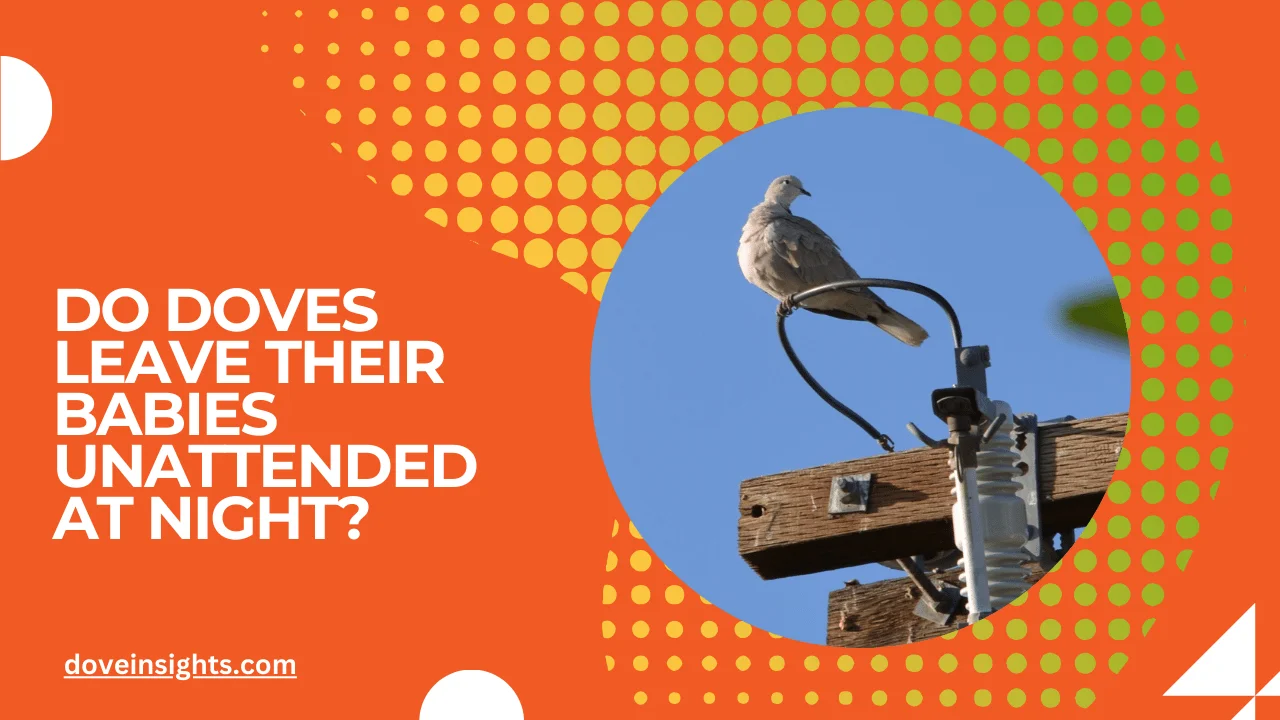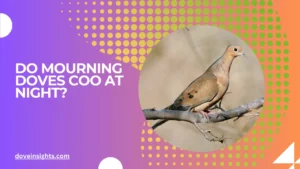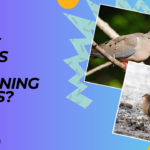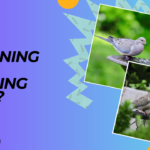When we think of birds caring for their young, images of devoted parents, tirelessly watching over their chicks, often come to mind.
In the case of doves, however, there is a fascinating and somewhat surprising behavior that raises a critical question: do doves leave their babies unattended at night? While many animals have highly protective parenting strategies, some birds, like doves, exhibit a more relaxed approach, especially when it comes to nighttime care.
Doves are often admired for their nurturing and gentle nature, but their parenting habits might challenge the way we think about avian care.
Most people are familiar with the notion that birds, including doves, will protect and care for their young during the day, but when the sun sets and darkness falls, what happens to dove chicks? Do their parents remain vigilant, or do they leave them vulnerable?
This article delves into dove parenting behaviors, the natural instincts of doves as parents, and why it is perfectly normal for doves to leave their babies unattended at night.
Through a careful exploration of dove nesting practices, we will uncover the truth behind this often misunderstood aspect of their life cycle.
Contents
Dove Parenting: A Closer Look at the Nesting Habits
To understand whether doves leave their babies unattended at night, we first need to explore how doves nest and care for their offspring.
Doves, including species like the Mourning Dove and the Rock Dove, typically build their nests in trees, shrubs, or even man-made structures. These nests are often simple, composed of twigs, grass, and other natural materials, offering a basic yet effective home for their eggs and chicks.
Doves are monogamous and often form lifelong partnerships, working together to build the nest and care for their offspring.
The female lays one or two eggs, and both parents share the responsibility of incubating the eggs. This cooperative parenting strategy ensures that the eggs are kept warm and protected until they hatch.
Once the chicks are born, the parents continue to care for them by feeding them a special secretion known as crop milk, which is rich in nutrients. However, as the chicks grow, they become more independent and eventually fledge, meaning they leave the nest and begin to learn how to forage for food.
Now, the question remains—what happens during the night? Are the parents still around, or do they leave the chicks to fend for themselves?
The Natural Behavior of Doves at Night
Unlike mammals, which are often highly protective and territorial over their young at all hours, doves exhibit a different pattern of parenting behavior.
In the wild, doves do not spend every waking moment hovering over their chicks. Nighttime care, in particular, may seem unconventional to us as humans, as many mammals, including birds like geese or swans, are more actively involved with their young at night.
Doves, on the other hand, are less focused on nighttime vigilance. As dusk falls, both parents typically leave the nest, especially if the chicks are older and capable of regulating their own body temperature.
Doves are diurnal, meaning they are active during the day and rest at night. They roost in trees or other safe spots, where they remain relatively safe from predators.
During the night, baby doves, or squabs, are left in the nest, but they are not entirely abandoned. The nest itself, often well-hidden in the foliage or on a ledge, provides some level of protection.
The chicks also rely on the warmth of the nest and their ability to huddle together for comfort and safety. It is a survival strategy that has evolved over time, allowing the parents to rest and recover from their daytime foraging activities.
In short, while it may seem concerning, it is completely normal for doves to leave their babies unattended at night. This behavior is rooted in their natural instincts and survival strategies.
Why Doves Leave Their Babies Unattended at Night
One of the most crucial factors in understanding why doves leave their babies unattended at night is to consider the nature of the dove species and their survival needs.
Unlike predators or birds of prey, doves are prey animals, which means they face a constant threat of being hunted by larger birds or mammals. As such, they have developed certain strategies that help them avoid detection and remain safe.
1. Reduced Risk of Predation at Night:
Doves, especially the Mourning Dove, are relatively non-aggressive and can be vulnerable to predators such as hawks, owls, and even domestic cats. However, the nighttime environment is often less active in terms of larger predators.
Doves can rest safely on high branches or sheltered ledges, out of reach from many of their natural threats. This enables them to rest and regain energy without the risk of leaving their young defenseless during the night.
2. Energy Conservation:
Doves need to stay energized throughout the day to forage for food, protect their nests, and care for their young.
By resting at night and leaving their chicks behind, the parents conserve their energy. This strategy is essential for their survival and their ability to care for their chicks during daylight hours.
3. Natural Instincts and Evolutionary Behavior:
Doves, like many other birds, have evolved to leave their young in the nest during the night. This behavior is part of their parenting strategy, where the chicks are kept safe and warm in a relatively quiet environment.
Over time, this strategy has proven effective, as doves are able to balance care for their young with the need to rest and avoid predation.
What Happens to Baby Doves at Night?
Now that we know doves leave their young unattended at night, what happens to the baby doves during these hours?
Baby doves, known as squabs, are highly dependent on their parents in the early stages of life. However, they don’t remain entirely vulnerable when left alone at night.
- Safety of the Nest:
The nest itself offers a certain level of protection. Doves are selective about where they build their nests, often choosing high, out-of-reach places that are difficult for predators to access. The natural surroundings provide camouflage, making it harder for predators to spot the nest. - Self-Sufficiency:
As squabs grow older, they become more self-sufficient. Feeding themselves becomes a gradual process as they transition from crop milk to solid food. - By the time they are left alone at night, they are often able to tolerate the cooler evening temperatures and keep themselves relatively safe.
- Parental Return at Dawn:
Although doves leave their chicks alone at night, the parents will return at dawn to resume their duties. The parents check on the chicks, provide food, and keep them safe during the day. This cycle repeats until the squabs are strong enough to leave the nest on their own.
Debunking Myths: Why Dove Parenting Is Often Misunderstood
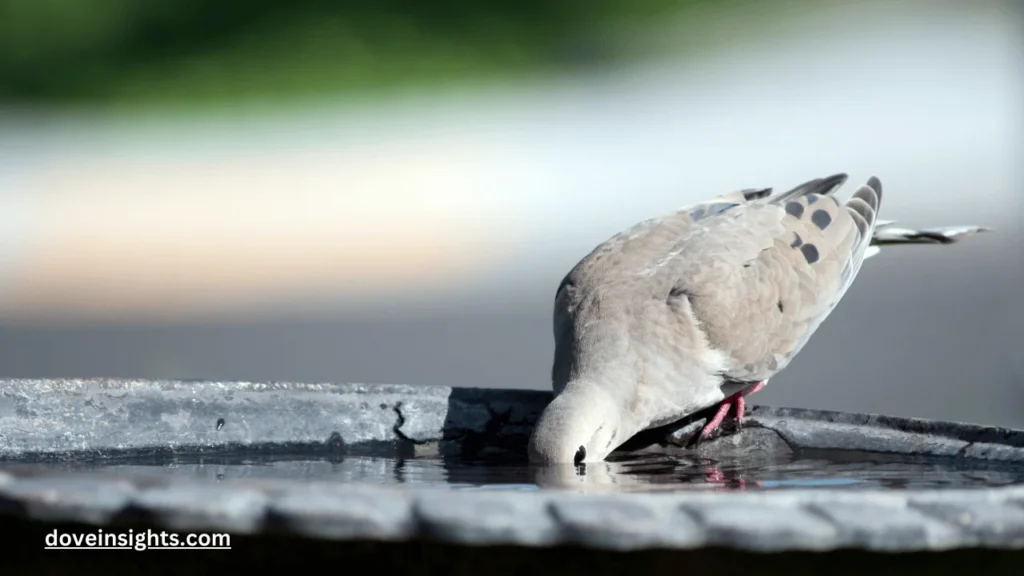
Despite the natural behaviors of doves, many people believe that birds, particularly doves, must constantly tend to their young, especially at night. This misconception can cause unnecessary worry for those observing wild doves and their nests.
1. Doves Are Not Neglectful Parents:
While it may seem like doves are neglecting their young by leaving them at night, their behavior is a well-adapted parenting strategy. Resting at night ensures that the parents are strong and alert during the day when their young need more care and attention.
2. Doves Provide Long-Term Care:
Doves don’t just leave their chicks in the nest and forget about them. They nurture their babies with crop milk, protect them from predators, and feed them until they are able to fend for themselves. The absence of the parents at night is simply part of their daily cycle.
3. Other Birds Exhibit Similar Behaviors:
Many bird species, including songbirds and other pigeons, exhibit similar parenting strategies. Leaving chicks unattended at night is not an anomaly but rather a survival tactic shared across many bird species.
Conclusion:
In conclusion, the fact that doves leave their babies unattended at night is not a sign of neglect or poor parenting. It is, in fact, a natural and evolutionary behavior that helps ensure the survival of both the parents and their young.
By resting at night, doves conserve energy, avoid predation, and return the next day to care for their squabs. The nest, often tucked away in a safe, camouflaged location, offers a secure place for the chicks to remain until their parents return at dawn.
Understanding the natural rhythms of dove parenting can help dispel myths and provide a more accurate picture of their lives. While it might seem unusual, this behavior is an essential part of the dove’s survival strategy and has worked well for these resilient birds for generations.
FAQ’s
Do doves leave their babies unattended at night?
Yes, doves typically leave their chicks unattended at night. However, this is a natural behavior that helps conserve energy for the parents.
Are baby doves safe when left alone at night?
Yes, baby doves are generally safe in the nest, which is often well-hidden and protected from predators.
Do dove parents check on their babies at night?
No, dove parents generally do not check on their chicks at night. They return at dawn to care for them.
What do doves do at night?
Doves rest at night, typically roosting in trees or sheltered spots to stay safe and conserve energy.
When do doves start leaving their babies alone?
Doves begin leaving their chicks alone once they are old enough to regulate their body temperature and begin to fledge.
Are doves neglectful parents?
No, doves are attentive parents but follow a natural rhythm that involves leaving their chicks alone at night.

